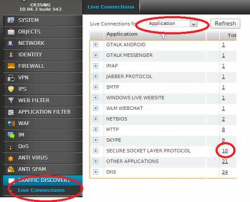SG720
 The SnapGear™ model SG720 is the flagship of the SnapGear family of firewall/VPN appliances. With multi-megabit throughput, two fast Ethernet ports, and three VLAN 10/100 ports standard, the ICSA-Labs Corporate Firewall Level certified SG720 is an excellent solution for branch offices of large organizations, as well as central offices of small to mid-sized enterprises (SME).
The SnapGear™ model SG720 is the flagship of the SnapGear family of firewall/VPN appliances. With multi-megabit throughput, two fast Ethernet ports, and three VLAN 10/100 ports standard, the ICSA-Labs Corporate Firewall Level certified SG720 is an excellent solution for branch offices of large organizations, as well as central offices of small to mid-sized enterprises (SME).
The SnapGear SG720 provides central site VPN, firewall and session load balancing capabilities with the capacity to securely connect hundreds of mobile and remote employees. The SNORT-based Intrusion Detection System (IDS) adds an extra security layer by detecting attacks and automatically adjusting and denying connectivity to that attack, or alerting administrators so that countermeasures can be implemented quickly before the network is compromised.
With its rich feature set and rack-optimized form factor, the SG720 is a compelling enterprise-class firewall solution at a mid-market price.
Flexible Network Configuration with Bandwidth Optimization
The SnapGear SG720 supports three 10/100 Fast Ethernet (FE) segments and two 10/100/1000 Gigabit Ethernet segments. Central and remote networks can connect to the Internet through a variety of broadband (ADSL, SHDSL and cable) or dedicated high-speed copper (T-1, T-2, fractional T-3 and full T-3) or fiber circuits (OC-1 to OC-3).
The SG720 improves available Internet bandwidth and connection uptime by providing traffic load balancing across dual WAN links while an embedded Web proxy cache, based on Squid, further accelerates Web page downloads. This makes the SG720 an excellent solution for organizations that are power Web users or have many remote offices accessing corporate intranets. Bandwidth can be further optimized through traffic shaping controls. Customers wishing to protect against access to inappropriate Web material can purchase an URL content filtering (UCF) subscription service. This works in conjunction with the URL proxy embedded in the SG720 to increase productivity and available bandwidth. The combination supports blocking, monitoring, rating and optional reporting without the need for an on-site URL database.
Fully Integrated Intrusion Detection System Assures Maximum Security
Although all SnapGear firewall/VPN appliances defend against Denial of Service and other common attacks, the SG720 raises the bar by detecting "suspicious" activity before it escalates into a full-blown network intrusion.
Reputation-based SPAM control
The SG720 incorporates the TrustedSource reputation-based SPAM control system. TrustedSource creates a profile of all "sender" activity on the Internet and then utilizes this profile to watch for deviations from expected behavior. This profile of electronic mail senders is leveraged by the SG720 to filter the majority of all unwanted traffic.
Web Cache for Rapid Web Response Time
The SG720 incorporates a powerful Web proxy cache to improve Web page response time and reduce link loads. Designed to integrate seamlessly with upstream proxy caches provided by ISPs, the SG720 allows complete tuning of the service using the management console GUI and command-line interface.
Failover and Load Balancing
Increase uptime and boost performance by connecting separate ports on the SG720 to two different Internet providers, and then combining these into a single "virtualized" high performance connection. A network outage on either link will automatically switch traffic to the operational link via the built-in link failover features. The resulting network redundancy makes it possible to reduce by half the number of security appliances required to protect a network while preserving maximum throughout and uptime. The traffic load-balancing feature also boosts the performance of Web transfers and the stability of a company network connected by DSL to the Internet.
Demilitarized Zones (DMZ)
Administrators can improve on-site and remote employee productivity without compromising security by creating DMZs that segment the network into private and public security zones. Typically, the private network will be used to secure "internal" data while the DMZ permits access to e-mail servers, Web servers, and other "public" applications and content.


